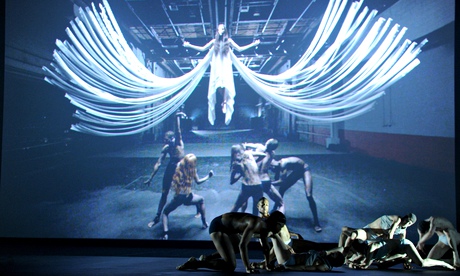
For those who accuse the fashion industry of taking itself a little seriously, the "live immersive experience" held by British designer Gareth Pugh at New York fashion week on Thursday might have seemed like a case in point.
Rather than staging a conventional catwalk show, Pugh's spring/summer 2015 collection was modelled by performers in the dimly-lit chambers of New York City's Pier 36. In scenes choreographed by Wayne McGregor, models danced and writhed; one levitated high above the rest, arms outstretched beatifically, strips of white fabric radiating like angel's wings.
While that might sound slightly over the top on paper, Pugh's event was actually bang on the money, setting the stage for a New York fashion week packed with spectacles rather than traditional catwalk shows. On Sunday, for example, the hip New York label Opening Ceremony is to host a Spike Jonze-directed play with actors wearing the New York designers' new collection. Other planned "happenings" include an undisclosed Polo Ralph Lauren event in Central Park and a project by Jeremy Scott, which the designer has said will involve Miley Cyrus and "a group of cool kids, rather than models". Meanwhile, Mulberry is to take the unusual step of involving members of the public in proceedings, staging a city-wide treasure hunt for a Cara Delevingne bag.
The rise of the "happening" this New York fashion week again raises the issue of whether catwalk shows – which have their roots in the Parisian couture houses of the 1800s – are a valid focus for the modern fashion industry. Twice a year, fashion buyers and editors travel en masse to the fashion capitals of New York, London, Paris and Milan to review the clothes set for release in shops six months later. But as the luxury industry becomes ever-more globalised – and as bloggers play critics while Instagram drives sales – the relevance of showing collections to a few hundred industry types sitting in hierarchical rows is increasingly being called into question.
In the digital age, there is the potential for shows to also be the basis for social media-friendly moments with a much wider impact. "The Chanel supermarket show in March had such a huge impact on social media – and we are still talking about it now," said Paula Reed, creative director of online retailer MyTheresa and former Grazia style director. But Reed was cautious about pronouncing the death of traditional catwalk shows. "I would never say that these shows are over. People have been saying that for 20 years but it never happens – because no one has come up with a better way to help press and buyers understand and digest their work.
"I'm dying to see a Spike Jonze play," said Reed, "but I would probably do that in my spare time and discuss it with friends over dinner afterwards. But during the shows I have maybe 10 appointments and deadlines; I'm trying to see everything and get a job done." In other words, while "happenings" might create social media buzz, catwalk shows remain the first choice for business.

